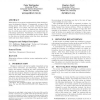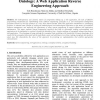828 search results - page 8 / 166 » A New Model of Program Dependences for Reverse Engineering |
WCRE
2005
IEEE
14 years 1 months ago
2005
IEEE
In recent years, code obfuscation has attracted attention as a low cost approach to improving software security by making it difficult for attackers to understand the inner worki...
MSR
2006
ACM
14 years 1 months ago
2006
ACM
Refactorings are program transformations which should preserve the program behavior. Consequently, we expect that during phases when there are mostly refactorings in the change hi...
ICCAD
1996
IEEE
13 years 11 months ago
1996
IEEE
Designer's productivity has become the key-factor of the development of electronic systems. An increasing application of design data reuse is widely recognized as a promising...
ESAW
2008
Springer
13 years 9 months ago
2008
Springer
The IODA methodology allows automated construction of models from an ontology, consisting of generic interactions that we can assign to families of agents. Thanks to the measuremen...
IAJIT
2010
13 years 6 months ago
2010
: The heterogeneous and dynamic nature of components making up a web application, the lack of effective programming mechanisms for implementing basic software engineering principle...


